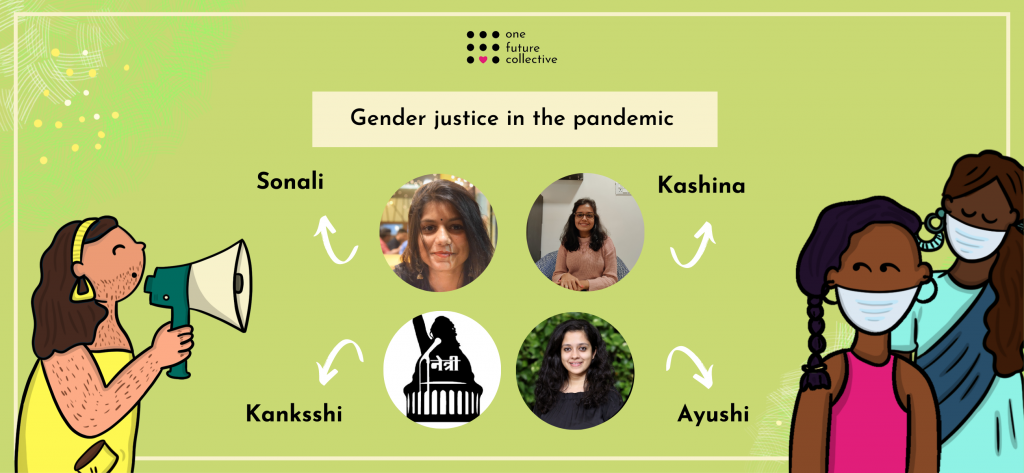On 22nd February 2022, One Future Collective hosted an IG Live on the theme of ‘Gender Justice in the Pandemic’ hosted by Advocate Sonali Shelar. She was joined by Kashina, assistant director at Prerana who heads the Anti-Trafficking Interventions; Kanksshi who is the founder of NETRI foundation; and Ayushi who is the co-founder of The Gender Lab. The conversation provides unique insights into how different on-ground activists and workers who deal with the issue of gender closely faced the challenge of the pandemic.
The conversation started with a critical look at the economy of India and how it has one of the worst gender gaps in economic participation and opportunity according to a study by the World Economic Forum. To that, Kanksshi added that women’s participation in the economic and political sphere has always been low in India. She also pointed out how most quantitative studies miss the perspective of counting per capita income and do not account for women’s work that is not in the organized, formal sector. She raised questions about how India could have the aspirational idea of becoming a $5 trillion economy when 50% of its population is not considered to be working. She also added that most of these statistical measures and data did not account for irregular or seasonal work or work which was disrupted due to maternal or health factors.
Ayushi added that during the pandemic, the distinction between men and women became more pronounced regarding who goes to work and who stays at home. Women had to engage in increased unpaid care work during this time. Even outside their homes, they had to work as ASHA workers in a gendered role. She mentioned that there is a need to incentivize women to work rather than simply creating jobs – the entire mindset surrounding women and work had to be changed.
Kashina, speaking from her own experience at Prerna, spoke of the number of families in Maharashtra who lost a male member due to Covid-19. As a result, the women of the families were forced to enter the job market and were desperate enough to join any job to sustain their families. Thus, they required upskilling and adequate training to become employable rather than relying on the monthly assistance scheme by the government. She mentioned how the process for procuring the financial assistance was long-drawn and not sustainable in the long run.
The conversation then turned to how women’s participation in governance processes (such as in the Panchayat) can create a difference in their lives. Ayushi spoke about how the community or the school should create a space for adolescent girls to allow them to place their opinion to bring change. Providing these girls with a platform and allowing them to exercise leadership can counter harmful patriarchal narratives about how their voices don’t matter. Kanksshi added on to that citing a study where communities with women-led MLAs had a better administrative experience. She spoke of women MLAs from Bihar and Telangana who had a strong system to help the people from their constituency during the pandemic. These MLAs physically ensured that rations were sent out and that the ration kits also had sanitary napkins in them – a necessity that is often forgotten.
The next topic of the conversation was the effect of the pandemic on young girls’ and women’s lives in the context of human trafficking. Kashina spoke of how human trafficking for sexual exploitation is a disguised action with intergenerational support. During the pandemic, the families living in margins became even more vulnerable and the number of child marriages increased. The children who were rehabilitated became vulnerable again and there was also a stark lack of data.
Then, the conversation turned to how The Gender Lab has been coming up with creative solutions to help young girls even as the schools were shut. Ayushi emphasized that listening to the invisible voices was important for figuring out the solution. Many of the young girls had mental health concerns, fear of child marriage, and abuse or violence. A lot of girls also left school to attend unpaid care work at home as they were also worried about the financial situation of their household. Ayushi mentioned how The Gender Lab focused on preventive work rather than immediate response work. They created a workbook for the girls named ‘My Safe Space’ through which they could feel that they are cared for and should not accept reality as it is. Kanksshi stressed that policy-makers must hear the voices of young girls too to make a more inclusive policy that benefits them.
The conversation ended with a short discussion on the ongoing judgments about marital rape and the participants hoped that the One-Stop Centre scheme would become powerful enough to help women quickly. They also stressed the importance of increasing awareness about laws, policies, and programs, especially among marginalized women.
